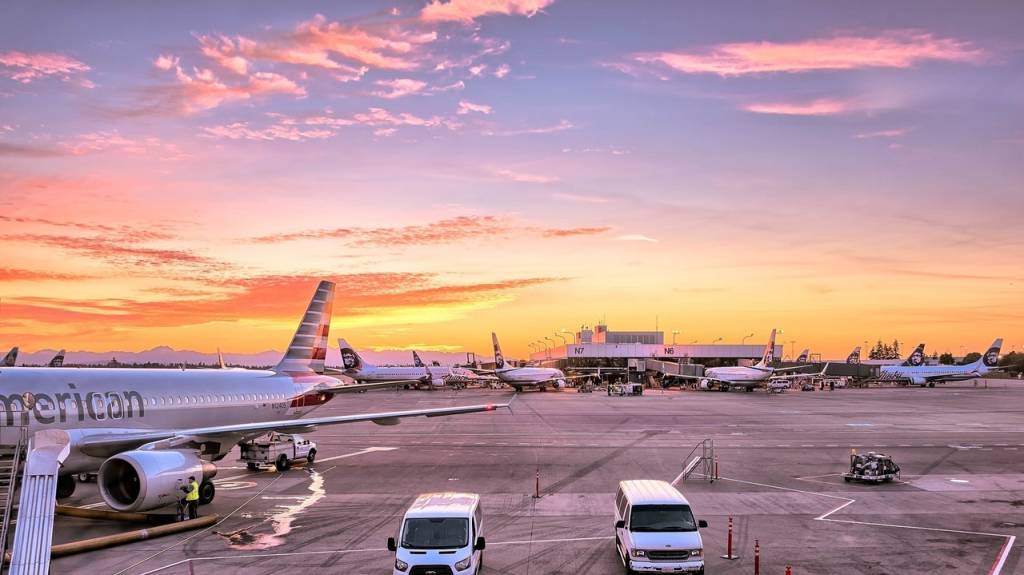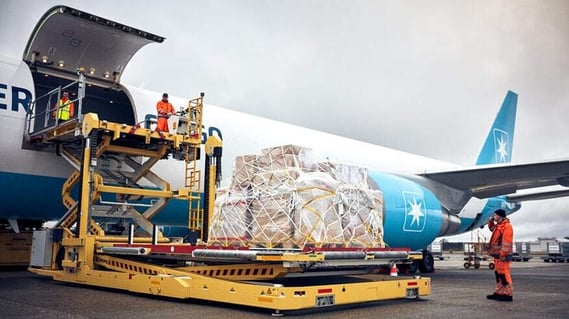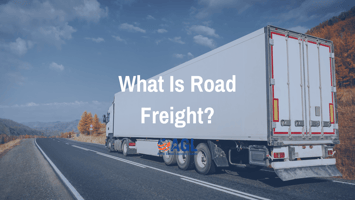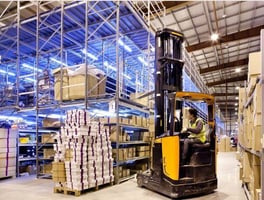What is Air Freight?
Air freight, or air cargo allows the transport of goods quickly by air. Shipping cargo by air has always been a high cost-to-weight form of shipment, countered by the fact that it’s the fastest way to transport goods internationally.
This method offers expedited delivery compared to other modes of transportation such as sea or land freight. Air freight services are utilised by businesses across many different industries to transport high-value, time-sensitive, and perishable goods to domestic and international destinations efficiently.
Air freight services are utilised by businesses across diverse industries, from manufacturing and retail to healthcare and technology, to meet tight deadlines, capitalise on market opportunities, and satisfy the growing customer demand for fast delivery.
Unlike other modes of transportation such as sea or road freight, which may take weeks to deliver, air freight offers unparalleled speed and reliability. With transit times ranging from just a few hours to a few days, depending on the distance and service level chosen, air freight is the preferred choice for time-sensitive shipments and urgent deliveries.
Efficient transportation of a business’s goods and cargo is essential for them to thrive. Among the various methods available, air freight stands out as a rapid and reliable option for shipping cargo across long distances.
Do You Need Air Freight for Your Business?
Air freight is a great option for businesses looking to ship products long distances in a short amount of time. It may also be the best option for businesses that need to ship goods internationally. Usually, air freight includes items with time-sensitive shipping and climate control needs. This includes perishable goods like food, wine, and flowers, and special goods like pharmaceuticals. While air freight can be a great option in many situations, it may also cost far more compared to alternative shipping methods. Our carrier experts can find the right option for your company.
Quick decisions and fast implementation are required for urgent shipments – thats our daily routine.
Together with our global partner network our experienced team guarantees the reliable processing of your transports according our high quality standards.
Personal customer service is our top priority.
Our professional team develops optimal and cost-efficient transport concepts to ensure the smooth delivery of your cargo globally.
We guarantee the suitable solution for your requirements.
What are the advantages of air freight?
- Time – transporting goods with air freight saves time – it’s much faster than shipping, rail or road transport
- Reliable – flights generally have reliable arrival and departure times with very few delays, so the shipment of cargo by air is very likely to arrive on time
- Low insurance premium – due to the shipment duration being so short, insurance premiums on air freight are generally lower
- Secure – the shipment of cargo by air is tightly managed by security, so the chance of cargo being stolen or damaged is low
- Less warehousing requirements – the clearance time for air freight is fast, and there’s generally less stock to unload than that for cargo ships, so customs clearance is fast, and the need for local warehousing is much lower
Types of Air Cargo
There are two types of air cargo – general and special cargo.
- General cargo includes high-value goods, such as electronics, jewellery and pharmaceuticals. Air shipping is more expensive than shipping by sea, but due to the high margins and the fact that many electronic goods are fragile, air freight is the most appropriate form of transport.
- Special cargo requires special conditions for transporting goods, such as temperature control, certain air conditions or protected casing (e.g. if the goods are hazardous or livestock).

What not to ship by Air Freight
The following goods cannot be transported by air:
- UN classified dangerous goods
- Lithium Batteries
- Power Supplies or Power Banks
- Illegal Goods
- Firearms
- Flammable Substances
- Explosives
- Biochemical Products
How are goods shipped by air?
Air freight can be consolidated into consoles. Consolidating freight with other shippers is often more cost-effective due to economies of scale, although it can often take time to pair up or group shipments.
When shipping goods, you’ll require a Master Airway Bill (MAWB), which is essentially a note issued by an airline or authorised agent which shows evidence of the contract of carriage. An airway bill works in a similar way to a Bill of Lading.
Cost breakdown:
Air freight pricing is calculated from three factors:
- Shipment Type (size and weight of goods, as well any specific requirements in the case of special cargo)
- Destination (international airport or a local / goods only airport)
- Speed at which delivery is required
In addition to this, air freight would incur other additional costs such as insurance, surcharges and customs duty / taxes.Trade Finance Global has a network of freight forwarders, freight experts and shipping / logistics partners that can help you get your goods from A to B.
Providing gateways to gateway service for our Freight Forwarding Customers.
The increasingly globalized nature of modern markets requires an air freight forwarder who can keep up with the capacity demands across multiple routes worldwide. What’s more, their services need to be fast, secure, and flexible enough to ensure reliable air shipping no matter the circumstances.
Working with carefully selected carriers, we operate with schedules on all the world’s major routes so you can plan with certainty and become more efficient. We offer a range of secure and highly flexible air shipping products, which allow a choice of delivery speeds to best suit your requirements.
Choose Transocean Logistics and allow our Air Freight Experts to eliminate all the pain and effort of dealing with carriers, customs, compliance, and paperwork, ensuring high quality throughout the supply chain.
Our air freight services operate from airport to airport. You can either drop the goods into one of our drop-off depots yourself, or arrange for a separate company to drop them off for you.
-
When you drop the goods at the depot, you will need to ensure that all of the necessary shipping documentation is included.
-
Your goods will be collected by a courier from an address of your choice, shipped via road and air, and then delivered to the destination airport.
-
Once the goods have been shipped to the destination airport, the consignee will need to clear the goods through customs.
-
In addition to these services, we provide an optional collection service whereby your goods are collected from an address of your choice and transported to the drop-off depot on your behalf.
-
Please be advised should any customs issues arise, it will be recipient’s responsibility to pay any clearance fees.

Take your supply chain to the skies
Transocean Logistics Air Freight is your gateway to safe, efficient and reliable air transport of your time-sensitive, high-value cargo.
Our air services are designed to meet your specific requirements, leveraging our own-controlled freighter network, strategic partners, or our in-house freight airline - Transocean Logistics Air Cargo - to fly your goods quickly and efficiently across the globe.
Expand your reach to customers around the globe with a stand-alone service or by integrating our other inland and ocean transport modes, warehousing, and customs services for a seamless end-to-end solution.
Go farther with our global gateways
Seamless and fast connectivity is key to keeping your supply chain on the move. Transocean Logistics Air Freight has now doubled its global air freight capacities, providing safe and reliable transport to 90+ countries. Take advantage of our strong airline partnerships or leverage our own-controlled freighter network to transport your goods with flexibility and ease across the globe.
Our strategically located gateways help you stay in control of your supply chain, avoid congestion and have visibility of your goods from start to finish.
- Get fast turnaround with more control over ground handling processes
- Limit the risk of theft and damage with dedicated Unit Loading Devices (ULDs)
- Reduce overall cost with multi-origin consolidations
- Expect higher service priority with larger consolidations shipped with core carriers
- Deconsolidation of dedicated ULDs under own management
Fashionably on time
Maersk Air Freight provided a quick and efficient solution that not only helped Accur8 Distribution meet its deadline but also save on costs.
Get your goods to their final destination safely and efficiently with Transocean Logistics air freight services.
Here at Transocean Logistics, we offer flexible air freight solutions to help our clients achieve their business goals. We maintain the highest standard in shipping and customer service, and we can help you streamline your supply chain. Air freight can help you cut down on delivery times and prevent theft. Air freight might not be right for every business, but our logistics experts at Transocean Logistics can help you determine the right shipping method for your needs. You can rely on us for top-quality air freight shipping services.
We offer tailormade complete solutions for your airfreight shipments including:
- Express services
- Dangerous cargo
- Temperature controlled cargo
- Customs clearance
- Project planing and implementation
- Warehousing



Benefits of Transocean Logistics Air Freight Over Other Kinds of Transportation
- Fastest Long-Distance Shipping
- Ship Anywhere on the Globe
- Easy Tracking
- Reliable Security
- Reduced Packing Materials
- Lower Insurance Premiums
- Reduce Warehousing
- Flexible Options
What You Need To Know About Air Freight Regulations
In order to ship your goods by air, you will need to meet certain regulations and requirements. Goods shipped by air need to be sufficiently packed and secured to prevent shifting during transit, and they also need to be in containers below certain size and weight limits. There is also a limit on what amount of goods can be shipped at one time. You can talk to a Transocean International logistics expert to learn more.
Why Choose Transocean Logistics for Your Air Cargo Shipping Services?
- Unbeatable Air Freight Services
- Convenient Warehousing Services
- Reliable Shipment Completion
- Experience Handling Large Items and Hazardous Materials
- Customs Brokerage for U.S./Mexico Trade
- Convenient Location Near an Airport and Cargo Hub
- Prices That Fit Your Budget
- Supply Chain Solutions
More than just about speed
- More control and flexibility with Transocean -owned air fleet
- Better ground control with global gateways
- Low inventory costs
- Highly reliable cargo timelines
- Quick response to disruptions
- Seamless journey with one point of contact

How Transocean Logistics Air Cargo helped transport a key safety component from Asia to Europe
When a prominent German motor vehicle manufacturer needed to transport a critical safety feature component – a Class 9 miscellaneous dangerous good (DG), Transocean Logistics Air Cargo stepped up and delivered efficiently.
With our own-controlled freight network and strictly standardised SOPs, our team of experts ensured maximum safety, compliance and efficiency in transporting this batch of DG. This ensured seamless journey from origin to destination with fewer touchpoints and allowed more flexibility in case of any unexpected disruptions.
HOW DOES AIR FREIGHT WORK?
Understanding the process of air freight is crucial for businesses looking to optimise their logistics operations efficiently. The process involves several key components:
Air Freight By Commercial Planes
Sometimes, air freight is transported aboard commercial passenger planes, alongside passengers’ luggage. Airlines designate specific cargo holds within their aircraft to accommodate freight shipments. This shared space allows for cost-effective transportation of goods while leveraging existing flight routes and schedules.
Air Freight By Freight Planes
Dedicated freight planes, also known as cargo aircraft or freighters, are used for transporting large volumes of cargo exclusively. These aircrafts are specially designed to maximise cargo capacity and facilitate efficient loading and unloading processes.
TYPES OF FREIGHT PLANES
There are various types of freight planes tailored to different cargo requirements. These include:
- Dedicated freighters: Designed solely for cargo transport, offering maximum payload capacity.
- Combi aircraft: Dual-purpose planes that accommodate both passengers and cargo, allowing for flexible operations.
- Charter planes: On-demand aircraft charters tailored to specific cargo needs, offering customisation and expedited services.
THE AIR FREIGHT PROCESS
The air freight process involves several stages, each essential for the successful transportation of goods via aircraft. Let’s explore the typical air freight process:
Shipment Booking and Documentation:
The process begins with the shipper (the business sending the goods) contacting an air freight forwarder or carrier to book the shipment. Documentation such as a bill of lading, commercial invoice, packing list, and any required permits or certificates is prepared and submitted to the carrier.
Cargo Consolidation and Packing:
The goods are packed and prepared for transportation in accordance with air cargo regulations and safety standards. Depending on the nature of the goods, special packaging, labelling, or handling instructions may be required to ensure safe transit.
Transportation to the Airport:
Once packed, the cargo is transported to the designated departure airport, either by the shipper or a third-party logistics provider. Specialised transport vehicles, such as trucks or freight trains, may be used to transport the goods to the airport.
Loading onto the Aircraft:
At the airport, the cargo undergoes security screening and is then loaded onto the aircraft.
Cargo handlers or ground crew carefully load the shipments into the designated cargo holds or compartments of the aircraft, ensuring proper weight distribution and secure stowage.
Air Transportation:
The aircraft departs from the origin airport and flies to the destination airport, carrying the cargo onboard. During the flight, the cargo is subject to various environmental conditions, such as temperature and pressure changes, which may affect certain types of goods.
Customs Clearance (for International Shipments):
Once the air cargo has arrived at the destination airport, the cargo undergoes customs clearance procedures if it is an international shipment. Customs officials inspect the cargo, verify documentation, and assess any applicable duties, taxes, or tariffs before releasing the goods for onward delivery.
Delivery to the Consignee’s Location:
Once cleared by customs, the cargo is transported from the airport to the final destination, either by the consignee (the entity receiving the goods) or a local delivery service. Depending on the agreement between the shipper and consignee, delivery may be made to a warehouse, distribution centre, retail store, or directly to the end customer.
Throughout the air freight process, effective communication between all parties involved, including shippers, carriers, freight forwarders, customs brokers, and consignees, is essential to ensure timely and successful delivery of the goods. Additionally, adherence to safety, security, and regulatory requirements is paramount to mitigate risks and maintain the integrity of the supply chain.
HOW AIR FREIGHT IS CALCULATED?
Several factors influence the cost of air freight services, including financial conditions, social factors, and working expenses.
Financial Conditions:
The cost of air freight is influenced by economic factors such as fuel prices, exchange rates, and market demand. Fluctuations in these conditions can impact air freight rates, affecting overall shipping costs for businesses.
Social Factors:
Social factors such as geopolitical events, regulatory changes, and labour disputes can also influence air freight operations and pricing. These factors may disrupt supply chains, leading to delays or increased costs for businesses.
Working Expenses:
Air freight carriers incur various operational expenses, including fuel, maintenance, labour, and infrastructure costs. These expenses contribute to the overall pricing structure of air freight services, reflecting the investment required to maintain reliable and efficient operations.
Air freight services play a vital role in global trade, offering businesses a fast and efficient means of transporting goods to domestic and international markets. By understanding the nuances of air freight operations and pricing, business owners can make informed decisions to optimise their supply chain logistics effectively.
For reliable and efficient air freight services tailored to your specific business needs, contact our team of experts today. Our experienced team is dedicated to providing seamless transportation services to help your business thrive, and get your air cargo exactly where it needs to go.





